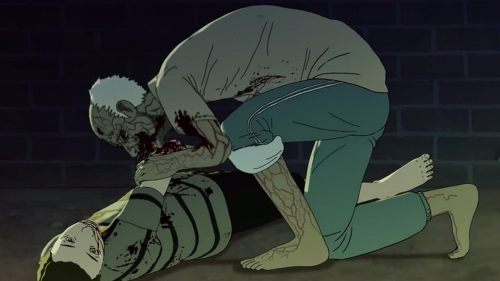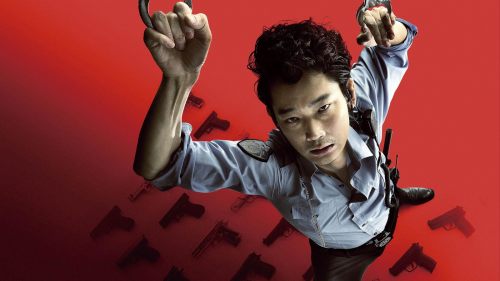NYAFF Review: SEOUL STATION Goes For The Jugular
The mythical creature we call the Zombie was always meant to have a deeper spiritual and metaphorical meaning. Director George Romero redefined the myth and re-contextualized its meaning with his legendary film Night of the Living Dead. In recent times however, the zombie in modern fiction has had its sub-textual depth completely expunged, being relegated to bullet fodder for action heroes or the go-to backdrop for character based interpersonal drama. The animated horror film Seoul Station aims to put the metaphor back into the monster with damning social commentary wrapped up in a tale of desperate survival.
The story unfolds mainly through the eyes of three characters: a young runaway named Hye-Sun, her manipulating louse of a boyfriend Ki-Woong, and her father Suk-Kyu who has come to the city to find her. The couple is destitute and desperate for money, getting into an argument when Ki-Woong puts tries to pimp out Hye-Sun via an online add. Hye-Sun has already suffered the indignity of prostitution and refuses to do it anymore, causing Ki-Woong to storm off in a selfish huff. When Suk-Kyu gets wind of his daughters whereabouts thanks to the online ad, he confronts Ki-Wong, demanding that he take him to his girl.
The nearby Seoul Station, the real world major railway terminal in South Korea's capitol, serves as ground zero for the zombie pandemic. In the film's opening scene, an injured man stumbles through the station promenade. A pair of onlookers gesture to help, but when they see (and smell) that he is homeless, they turn away in disgust. The first of several biting social critiques presents itself here - in this case, an admonishment of the polite conventions of a Korean society that would leave the down-trodden to rot. As the journey toward the main characters’ reunion begins, we see Hye-Sun encountered by a mob of bloodthirsty undead. She and a group of nearby homeless flee for their lives and find refuge at a police station, but the cops only see the desperate survivors as a gaggle of deranged bums and offer them no quarter.
Later on, Suk-Kyu and Ki-Woong encounter a heavily fortified police roadblock as they attempt to to reach Hye-Sun. A group of several dozen survivors in an alley are trapped between the police blockade and their own make-shift barricade set up to keep the zombies at bay. At this point, the allegory shifts gears and becomes a harsh condemnation of police brutality, government militarization, and the incompetence/apathy of authority as the people are held in a quarantine enforced by fire hoses, tear gas, and lethal gunpoint.
At the film's climax, the through-line of commentary pivots once more, this time into a brief condemnation of economic class division. After just barely escaping a legion of unyielding zombies, one of our heroes scrambles through the open window of what appears to be an apartment building to seek aid. The cries for help are to no avail, for the building is actually a lavish interior decoration showroom, a display for other high rises and condos that can be purchased for a hefty sum. The desperate struggle to survive both the undead horde and the cruelty of the living is a direct reflection of the struggle for survival and to make ends meet.
With all those metaphors on its plate, Seoul Station thankfully never forgets to also deliver on straight up unadulterated zombie movie horror. Once the film builds its momentum and the audience gets on board, every dangerous situation becomes palpably tense and every kill becomes gruesomely disturbing. The unsettling nature of the violence and tension is very much attributable to the animation as much as the screenplay, though the effect isn't immediately obvious.
Director Yeon Sang-Ho is famous for his two previous critically acclaimed animated films: 2011's The King Of Pigs is a disturbing and violent exploration of childhood bullying and the trauma it leaves, while 2013's The Fake is a blistering critique of organized religion. Whereas The King of Pigs had a somewhat fluid style in line with contemporary animation, The Fake had a more stilted yet grounded approach to its animation that produced a purposefully unsettling effect, and that stilted aesthetic carries over to Seoul Station. It takes some time to get used to the not-quite Rotoscoped movement on display, especially when the characters perform colloquial exaggerated gesticulations (melodramatic hand waving, guttural over-emphasis of phrases), which one assumes would be better served by fluid motion. However, that uncanny valley effect serves to constantly keep your perceptions on edge, inducing the feeling that something is profoundly askew throughout its runtime, which ultimately reinforces the allegory about a broken society.
Seoul Station is actually the first part of a longer Korean Zombie saga that will play out in theaters this year. It is the precursor to the Yeon Sang-Ho's live action directorial debut Train To Busan, which takes place one day after the events of the animated feature. Train To Busan premiered at Cannes earlier this year and has garnered substantial positive buzz. There have been several comparisons being made to Bong Joon-ho’s masterpiece Snowpiercer, there there is no doubt that Yeon has the wherewithal to play in that same allegorical league based on his body of work thus far. Seoul Station infuses new life into the worn out zombie movie genre with blood-pumping thrills and an incisive Korean point of view which separates it from the crowd.



